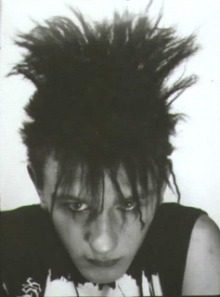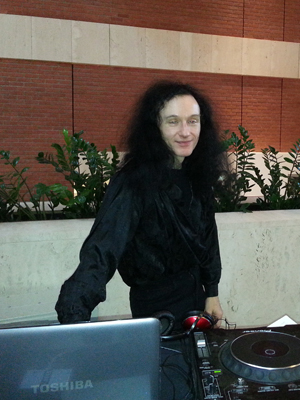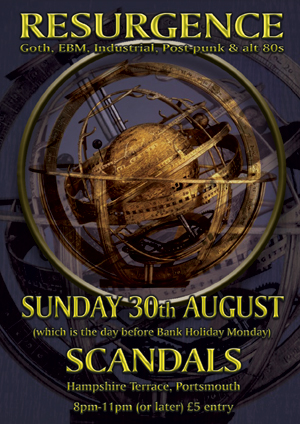Posted by Amaranth
Inspirational: Pete Scathe

One of the most amazing things about the alternative scene is its people – those who inspire and give of themselves to bring about its beauty. I wanted to pay homage to those individuals who have not only inspired me but who are pillars of our delightful dark society – keeping it aloft and helping it thrive.
Pete Scathe is one such person, the been-there done-that character who not only run and spun the decks in one of my favourite goth haunts but also chronicled The History of Goth. This is the place to learn about your gothic ancestry from a first hand and thoroughly knowledgeable account – Scathe has become our scene’s unofficial and much welcomed historian. He even tackle’s the great WIG (what is goth) question and it’s a must-read for anyone who aligns themselves with the goth movement (in whichever form it has evolved into). Although he now DJs indie, rock and metal nights (making him really quite well-versed in almost all alternative music), his goth night does still resurge now and again ;)
 How long have you been in the scene and tell me what first attracted you to it? Do you see yourself ever leaving it? Or how has it already changed for you over time?
How long have you been in the scene and tell me what first attracted you to it? Do you see yourself ever leaving it? Or how has it already changed for you over time?
I’ve been in and out of the scene since it was starting, so a disturbingly long time, somewhere between 3 and 4 decades. I never made a conscious effort to join “the goth scene”, it just formed around me. I was too young to be a first-generation punk but I loved the post-punk bands that followed, like Joy Division, and the early goth bands were part of that larger scene. I also liked a lot of bands who weren’t part of that scene, like The Chameleons and Fad Gadget, but it just happened that the majority of the bands I liked were “goth” bands and the people I was hanging around with and meeting at gigs were what we’d later call goths. Then one day someone came up to me and said “You’re one of those “gothic punks”, aren’t you?” and that was it. I’d been tagged.
Obviously the goth scene has changed an awful lot in the past few decades, not always in ways that I’ve been keen on, but I’ve generally kept an interest in it, a bit like an old family pet you can’t help but retain an affection for even when it’s just dribbled on your jeans.
Describe yourself in one sentence:
Smaller-than-life-size alternative DJ and historian.
And your main outlook/ethos in life:
I’m one of a diminishing number of people from the 80s alternative scene who’s still a left-leaning atheist vegetarian, possibly because I’m also one of a diminishing number of people from the 80s alternative scene who’s still skint.
 What does Goth mean to you?
What does Goth mean to you?
It used to mean vertical hair, great music, rammed gigs and smoky nightclubs, although these days walking into a goth club tends to involve thinking “Crikey, where did all these old people come from? Oh god I’m one of them.”. More seriously, I think goth should be given credit as a scene where intelligence and creativity are seen as positive things, and I don’t think it got the respect it deserved as being a scene where people who didn’t fit the masculine male/feminine female stereotypes could feel perfectly comfortable.
This is maybe less of an issue these days, but back in the 80s such sexual stereotypes were very much in effect, and goth picked up from the Bowie Glam/early New Romantic scenes as somewhere that non-stereotypical people were actively welcome. At the time it was one of the sticks used to beat goth with in the media and elsewhere, but I think it should be actively celebrated.
Why have you chosen to be an active contributor to the scene?
I don’t think at any point I’ve thought “This scene needs me to contribute to it!”. It’s more a case of thinking “Maybe I should DJ a goth night” or “I guess I should write that history of goth”.
What contribution are you most proud of?
That would have to be my History of Goth site. Way back in the late 90s, things seemed to be getting a little confused between metal and goth, mainly due to Marilyn Manson, and I thought someone had better make it clear that the roots of goth were in the punk/post-punk scene rather than having anything to do with metal. Since there wasn’t an in-depth online history of the early goth scene on the web back then, I thought someone had better do one. So I did. Since then it’s become almost the “official” online history of goth, and has been used by a lot of people as a resource for their own work on the scene, including books and academic works. In fact it’s been been so extensively used that people sometimes reference people who’ve quoted me (and so on) without realising where the original quote came from. Which is quite an achievement in a way. It’s also led to things like being interviewed on Radio 2 and being involved in last year’s Gothic exhibition at the British Library (which was great).
 Who in the scene do you admire/respect?
Who in the scene do you admire/respect?
I don’t admire anyone as such, but I certainly respect some people for their talents and contribution to the scene. If I had to choose anyone in particular it would probably be Siouxsie Sioux. Her strikingly inventive music and style massively influenced the scene, and I think having such a strong and creative woman as one of the “scene founders” was definitely a positive thing for the goth scene (as it would be for any scene).
Recommend some bands
The trouble is with recommending bands is that after saying “Listen to this lot, they’re great!” they almost inevitably release something that isn’t, and I so often find myself saying “Well they were great before that one…!”. So the first O Children is great, and the first 2:54 album is great, but then they both released albums that were… kinda OK. Not to mention the legions of bands from the 80s who went horribly wrong after showing immense promise, like the original manifestation of Danse Society. From back then I think the most consistently good band who weren’t one of the main bands in the scene were Play Dead. More recently I do like some of the stuff that’s going on at the moment with the post-punk/coldwave revival, like Savages, and the new Lilies and Remains album is also jolly good in a post-punk kinda way. Although there are a lot of those bands who seem to have one or two very good songs and a lot of average ones, like Phosphor.
Favourite quote
“This world is a comedy to those that think, a tragedy to those that feel” – from Horace Walpole, possibly lifted from Jean de la Bruyere. I suppose Horace Walpole should be counted as an honorary goth forefather, having started the Gothic literary scene, from which the goth tag indirectly derives. He’s also the first person I know to call himself a goth since the Dark Ages, having said in 1781 that “I am too, though a Goth, so modern a Goth that I hate the black letter, and I love Chaucer better in Dryden and Baskerville than in his own language and dress”. Not seriously, of course, as he rarely meant anything that seriously. Which is why his letters are so much fun. As opposed to his bonkers gothic novel, the Castle of Otranto, which wasn’t the most promising way to kick off a literary genre.
Favourite word
Oh, I don’t know… today’s favourite word is Circumvallation. Tomorrow it might be Praemunire.
